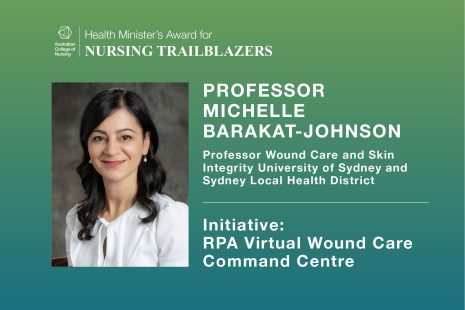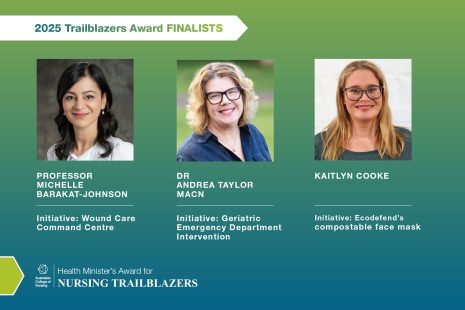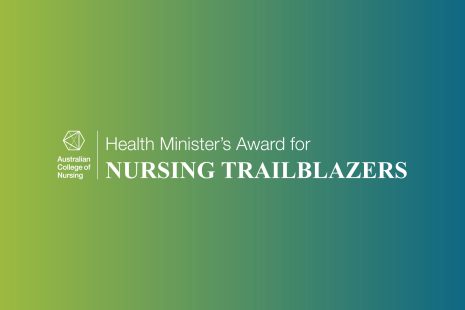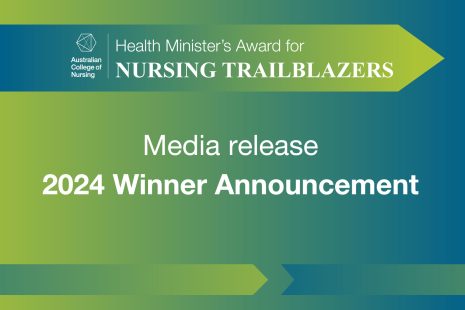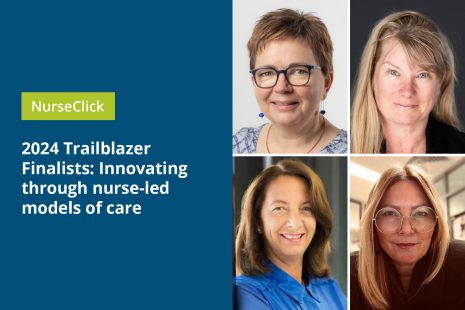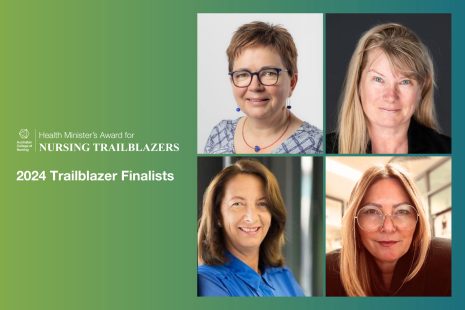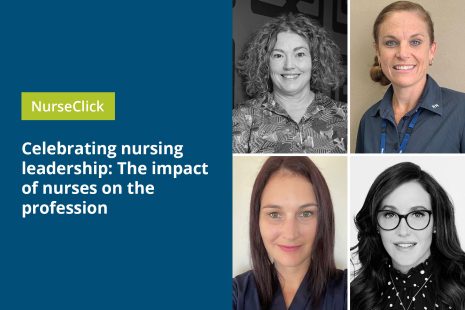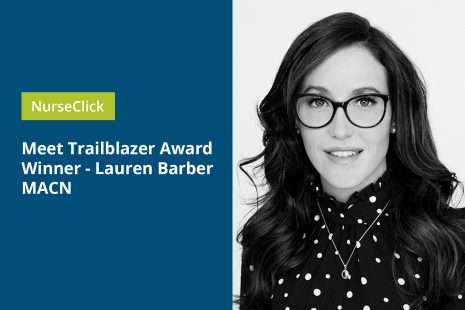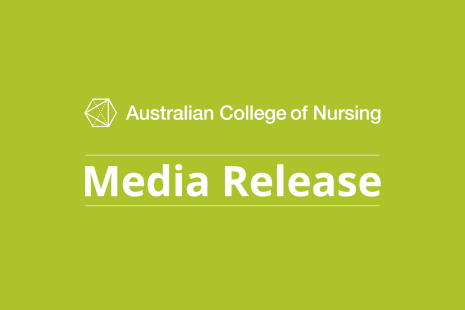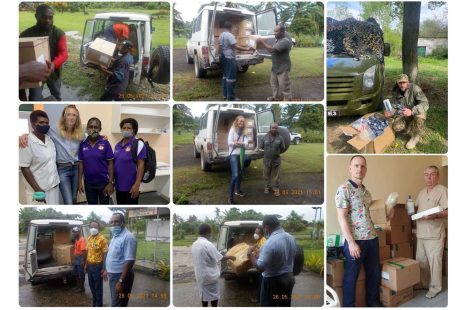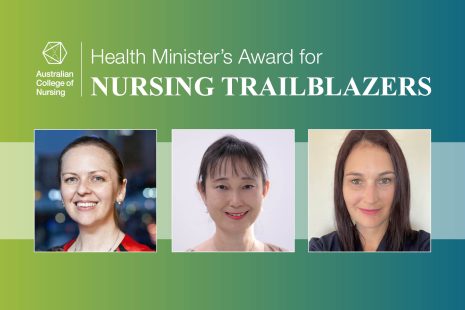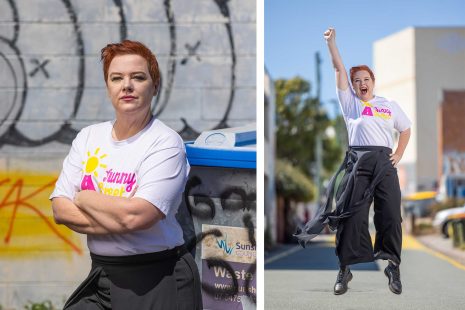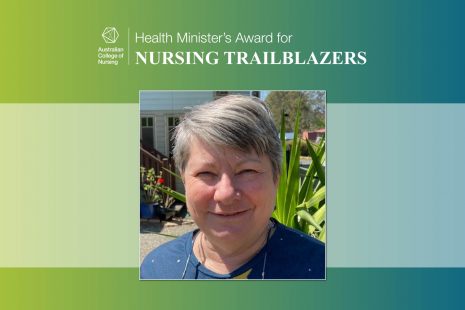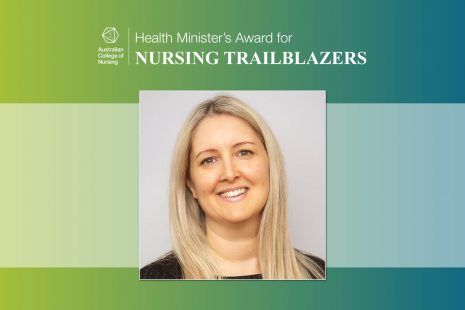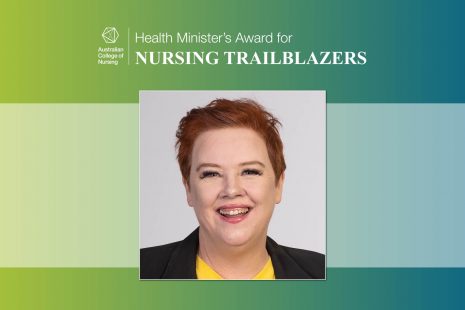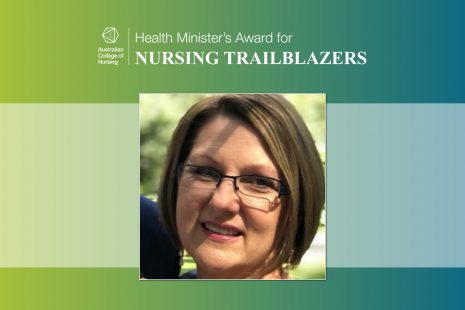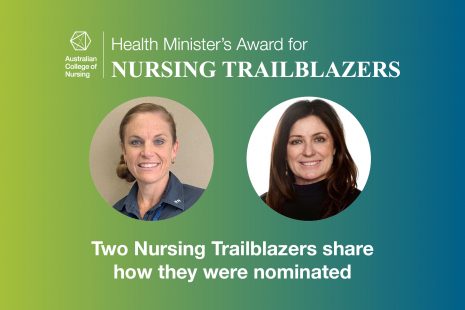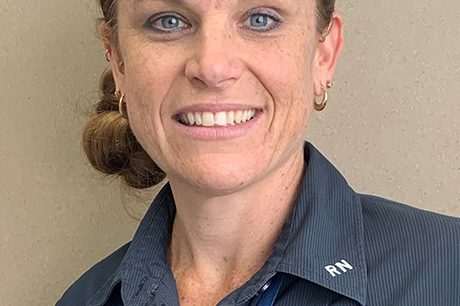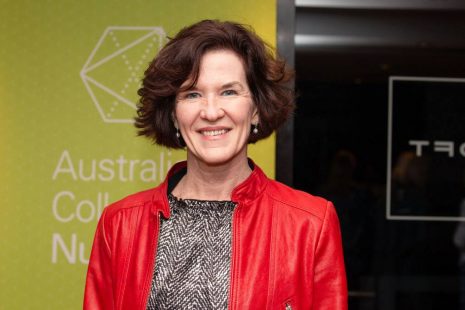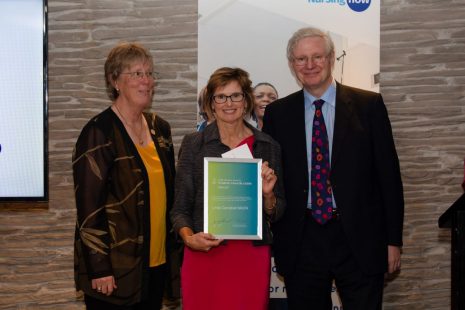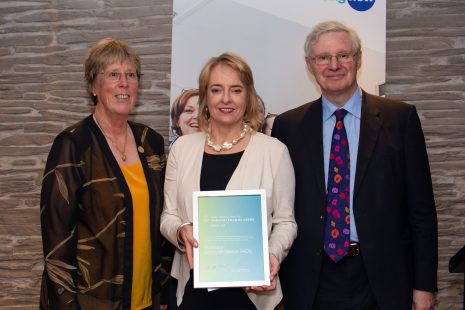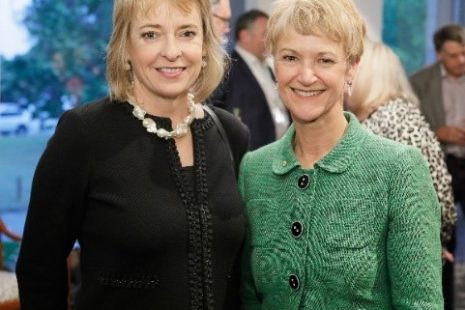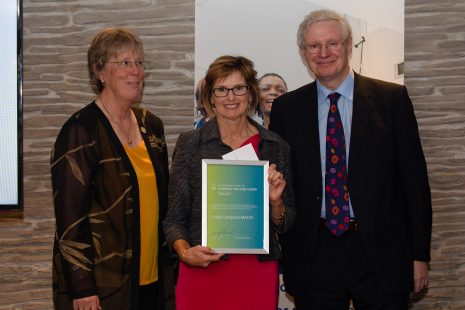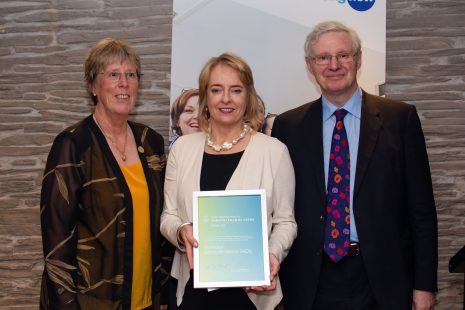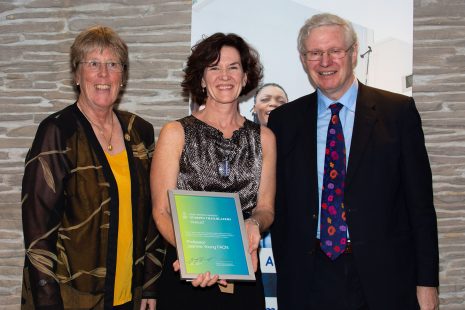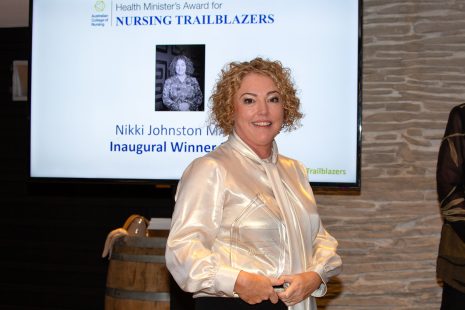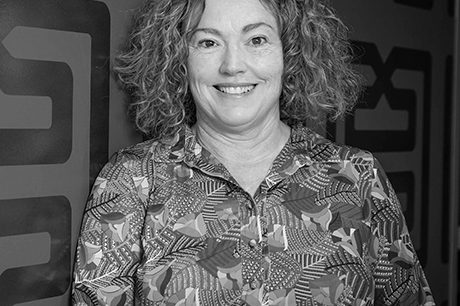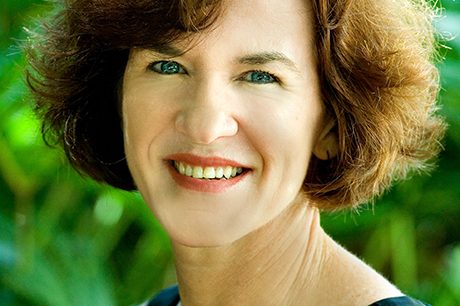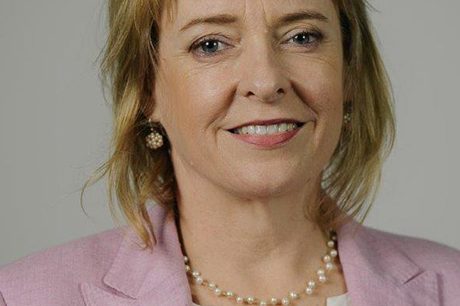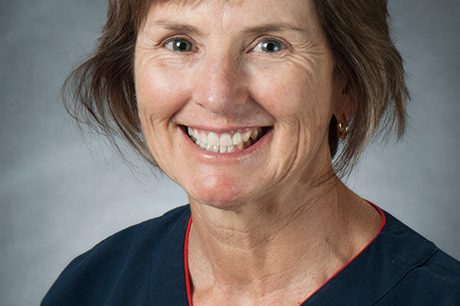
2025 nominations
About the Health Minister’s Award for Nursing Trailblazers
The Health Minister’s Award for Nursing Trailblazers is the only award of its kind in Australia. The award recognises nurses who through qualities such as leadership and innovation, are helping transform Australia’s health and aged care systems. Trailblazers make a difference by improving quality of care, by keeping their communities healthy, by ensuring access to treatment and care for everyone, by recognising that some members in the community require a different approach to achieving good health.
Celebrating nurse-led innovation
These original nurse-led solutions and creative models of care can help improve our Australian community’s health outcomes through evidence-based innovative processes. This award highlights the ingenuity of nurses and how essential and indispensable your contribution to the wellbeing of the community is.
The Trailblazers Award was founded by the Federal Government Minister for Health in 2019 and the Australian College of Nursing (ACN) is proud to be the administrators. The award acknowledges that nurses and the nursing profession can envisage and implement innovative solutions to many problems that negatively impact the Australian health and aged care systems. The prestigious Trailblazers Award is given to an outstanding and innovative ACN member who has demonstrated leadership by bringing new thinking to a particular healthcare challenge that needs to be addressed.
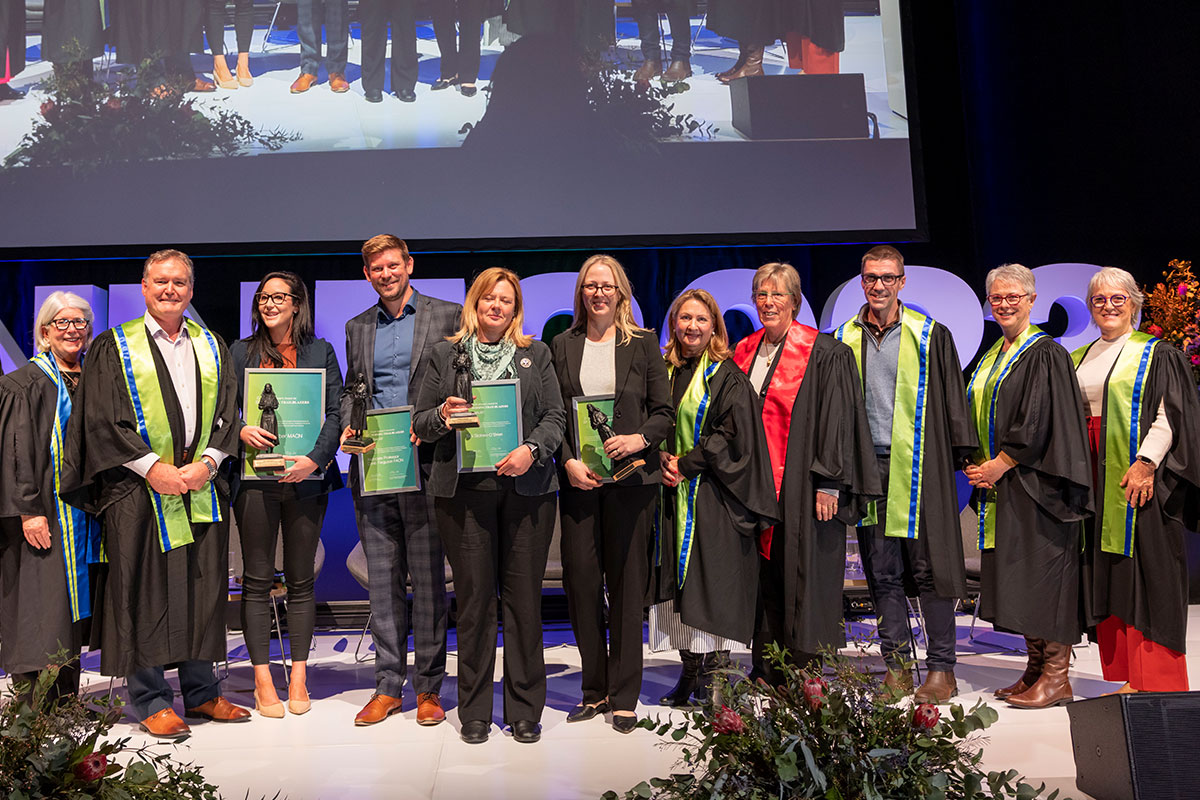
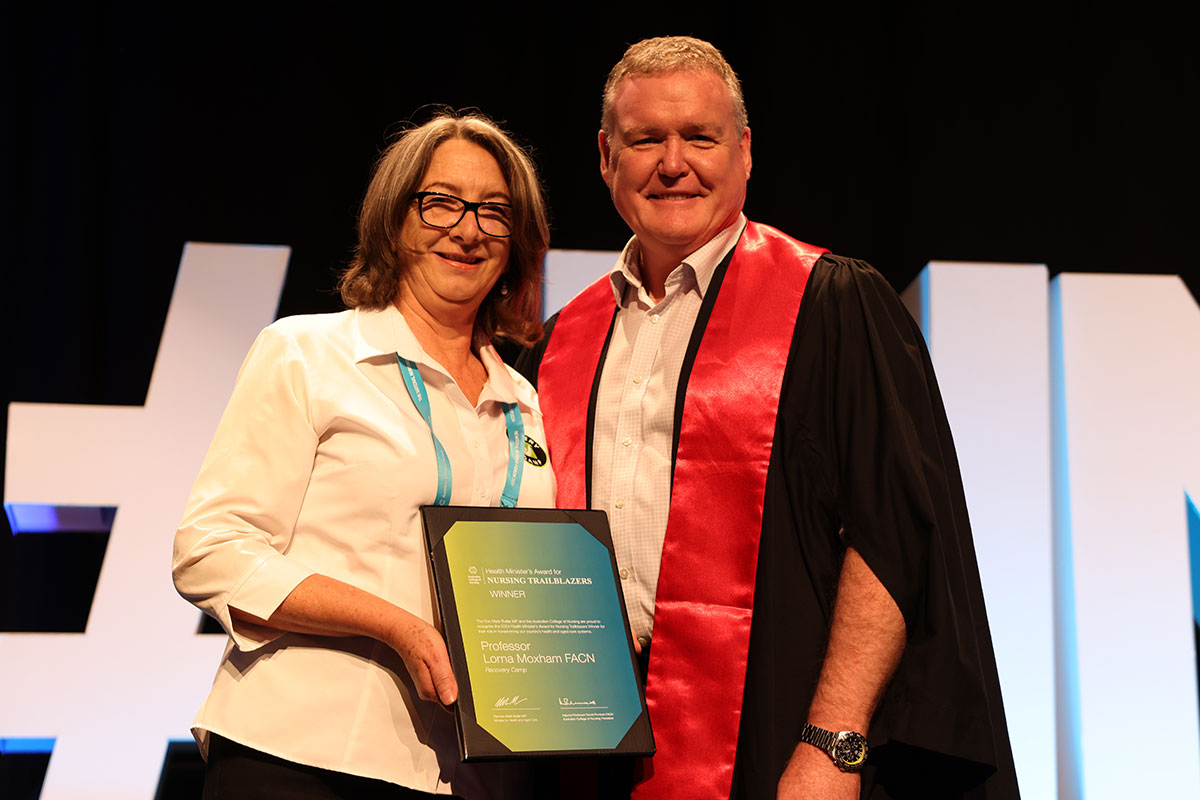
Selection criteria
ACN will facilitate the nomination and selection process in line with the below selection criteria. Your innovation:
- Addresses the challenges that are present in your environment for those seeking a healthcare solution.
- Makes a significant contribution to nurses and/or the nursing profession and contributes to better health outcomes for the Australian community.
- Showcases a novel approach taken by nurses that reflects the holistic and integrated philosophy underlying nursing care.
- Demonstrates an innovative intervention or fresh take on a model of care that resolved a problem in the delivery of health care or addressed an unmet health need of a population.
- Is proving to be a success.
- Was a cost-effective response to an identified issue.
- The solution can be replicated in other towns, cities, regions across Australia.
Nomination process

Nomination
Nominees can self-nominate or be nominated by either their peers or health consumers.
Nominations for the 2025 Health Minister’s Award for Nursing Trailblazers are now closed.

Selection
The Trailblazer Award selection committee will review nominations and make their decision based on the selection criteria and information provided in the submission only. A list of finalists will be presented to the Health Minister, who will select the winner of the Health Minister’s Award for Nursing Trailblazers.

Announcement
The selected winner will be announced by the Health Minister at ACN’s National Nursing Forum. The winner will receive an award, a gift pack, be promoted on the ACN website and invited to speak at the annual ACN National Nursing Forum. They will also be profiled in ACN’s exclusive membership communications ‘ACN Now’ and ‘The Hive’.
Frequently asked questions
Any nurse who has demonstrated leadership by bringing new thinking to a particular healthcare challenge can be nominated.
Yes, you can. Be proud of what you have achieved and share your innovation, your achievement and what it means to the people it impacts.
Yes, they will. And if you are nominating someone else, don’t worry if you don’t know all the details surrounding the innovation, but please make sure you leave contact details for your nominee.
The assessment will be against these selection criteria. Your innovation:
- Addresses the challenges that are present in your environment for those seeking a healthcare solution.
- Makes a significant contribution to nurses and/or the nursing profession and contributes to better health outcomes for the Australian community.
- Showcases a novel approach taken by nurses that reflects the holistic and integrated philosophy underlying nursing care.
- Demonstrates an innovative intervention or fresh take on a model of care that resolved a problem in the delivery of health care or addressed an unmet health need of a population.
- Is proving to be a success.
- Was a cost-effective response to an identified issue.
- The solution can be replicated in other towns, cities, regions across Australia.
Download the Trailblazers Award Information pack for all the details.
For more information about the Health Minister’s Award for Nursing Trailblazers, please download the information pack.
Read more about our Trailblazers
Past Trailblazers
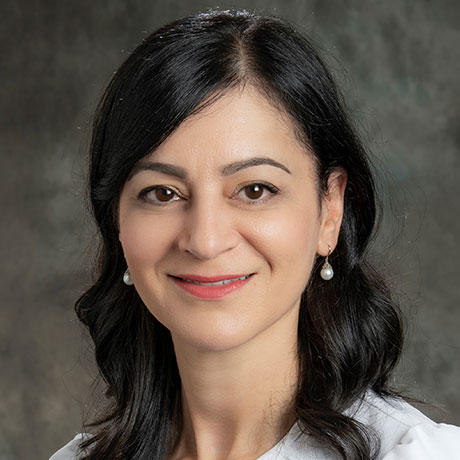
Professor Michelle Barakat-Johnson
Professor Michelle Barakat-Johnson
 Michelle Barakat-Johnson is the conjoint Professor of Wound Care and Skin Integrity and Skin Integrity Clinical Lead at SLHD and the University of Sydney Faculty of Medicine and Health, and the Director of the Tissue Repair Institute (A newly established institute at SLHD and University of Sydney) dedicated to advancing research in skin integrity.
Michelle Barakat-Johnson is the conjoint Professor of Wound Care and Skin Integrity and Skin Integrity Clinical Lead at SLHD and the University of Sydney Faculty of Medicine and Health, and the Director of the Tissue Repair Institute (A newly established institute at SLHD and University of Sydney) dedicated to advancing research in skin integrity.
With over two decades of experience in wound care clinical and research leadership, Prof Barakat-Johnson specialises in innovative, evidence-based approaches that improve patient outcomes, enhance clinical practices, and reduce healthcare costs. She is the founder of the Wound Care Command Centre at SLHD which is expanding to service NSW, an NHMRC Parentship grant recipient in 2024 to expand on the Digital Wound Model of Care, CI on six competitively-funded Q1 research grants totalling over $9,000,000 in funding since 2019 and an Award recipient of the 2023 EPUAP Investigator award for her work on pressure injury prevention across one health district and the ability to reduce PI reduction and sustain the reduction.
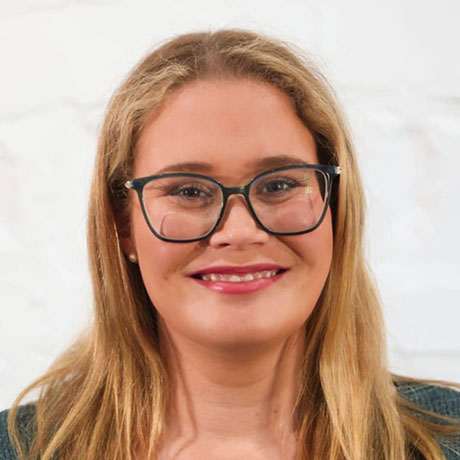
Kaitlyn Cooke
Kaitlyn Cooke
 Kaitlyn Cooke is a visionary Australian healthcare professional and environmental advocate, committed to transforming how the medical industry approaches sustainability.
Kaitlyn Cooke is a visionary Australian healthcare professional and environmental advocate, committed to transforming how the medical industry approaches sustainability.
As a paediatric nurse working on the frontlines during the COVID-19 pandemic, Kaitlyn was struck by the staggering volume of medical waste generated each day, particularly single-use facemasks. Witnessing the environmental cost of essential care, she decided to act.
Driven by a deep sense of responsibility to both people and the planet, Kaitlyn founded EcoDefend, a groundbreaking initiative aimed at eliminating single-use microplastic waste in health care. She went on to develop Australia’s first fully compostable face mask, an innovation that maintains medical-grade protection while significantly reducing environmental harm. Unlike conventional masks that persist in landfills and leach microplastics into ecosystems, EcoDefend masks are designed to break down naturally and can even be transformed into biochar, a sustainable material used in agriculture, infrastructure, and water purification. Kaitlyn’s work is more than product innovation—it’s a call to reimagine sustainability in healthcare.
Through EcoDefend, she partners with hospitals, universities, distributors and health leaders to help them reduce their environmental footprint while upholding the highest standards of care. Her approach proves that small, intentional changes can lead to large-scale impact.
By championing compostable, planet-friendly alternatives, Kaitlyn is helping to ensure that caring for people no longer means harming the earth. Her mission is clear: protect health without compromising the environment. With EcoDefend, Kaitlyn Cooke is leading that charge, redefining what responsible health care looks like, one compostable mask at a time.
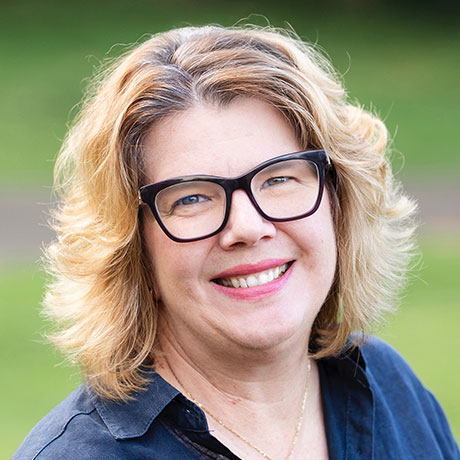
Dr Andrea Taylor MACN
Dr Andrea Taylor MACN
Dr Andrea Taylor is a clinical academic nurse passionate about improving outcomes for older adults through evidence-based, nurse-led models of care. Andrea’s career has spanned acute hospital settings and community-based services, providing a unique perspective on how fragmented care pathways can accelerate decline in older people, especially those living with frailty, cognitive impairment, or functional limitations.
Andrea played a central role in the development of the Geriatric Emergency Department Intervention (GEDI), a nurse-led, evidence-informed model that reshaped the way older adults are managed in emergency departments. GEDI has since been implemented across multiple sites in Queensland and is recognised nationally for improving care quality, patient flow, and clinician confidence.
Her current research extends this work into the surgical setting, where frail older adults continue to experience disproportionately poor outcomes. She is leading the co-design of a new care model that spans the entire acute care continuum – from ED presentation to post-operative discharge. This is the first Australian initiative of its kind and is grounded in the principles of co-design, advanced nursing practice, and translational research.
As a clinical academic, Andrea’s work at the intersection of research, practice, and policy, ensures that the innovations we design are scalable, sustainable, and centred around what matters most to patients. She is committed to advancing nursing-led research, mentoring the next generation of nurse leaders, and driving improvements that honour the complexity and dignity of older people.
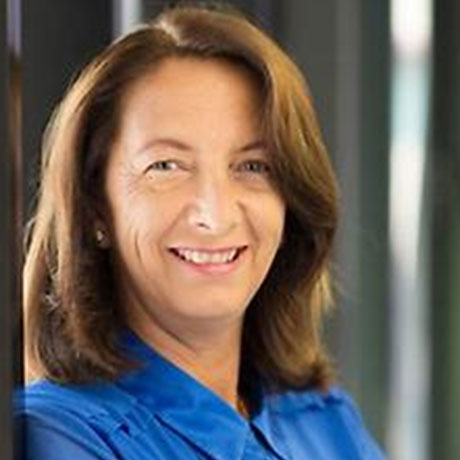
Professor Lorna Moxham FACN
Professor Lorna Moxham FACN
 As an immigrant, housing commission and state school educated girl from a background far from privilege, Lorna started her nurse training at Concord Repatriation Hospital in April 1980 after an unfulfilling 6 months of being a trainee insurance underwriter. Wanting to specialize in Mental Health, she commenced her Psychiatric Nurse Training at the Rozelle Hospital in Sydney. After successfully passing her state exams, she registered as an RPN, in 1985.
As an immigrant, housing commission and state school educated girl from a background far from privilege, Lorna started her nurse training at Concord Repatriation Hospital in April 1980 after an unfulfilling 6 months of being a trainee insurance underwriter. Wanting to specialize in Mental Health, she commenced her Psychiatric Nurse Training at the Rozelle Hospital in Sydney. After successfully passing her state exams, she registered as an RPN, in 1985.
In 1985 nursing education started its transfer to the higher education sector. Inquisitively, Lorna wondered what this was all about, and so started her journey of ongoing professional development. Despite failing her year 12 higher school certificate, she has now proven to the teacher who said she would amount to nothing, that you cant hold a good nurse down. Lorna now has a number of degrees, including a PhD uneasily earned after many years and many hours of study.
Fast forward 44 years from commencing nursing – Lorna is Professor of Mental Health Nursing at UOW. She is also Co-Founder / Co-Director of Recovery Camp. Recovery Camp is truly innovative – the only evidenced based, social enterprise that has been commercialised and thus made sustainable, in Australia. 43 camps, 14 universities, 600 people with mental illness, professional development for facilitators and a pipeline to the mental health nursing workforce.
Lorna feels privileged to have been contributing to her profession for over 4 decades. For her to do this, Lorna works closely with Dr Christopher Patterson – her nursing co director at Recovery Camp. Lorna is also supported by her husband Paul – also a nurse who works clinically and her daughters Janaya, a proud Wiradjuri woman and primary school teacher and also Georgia, who is completing her own studies at university. To compliment the support – Ariana, Lorna’s 8 year old granddaughter lives with her.
Media release statement
For 42 of Lorna’s 44 years as a nurse, she has specialised in mental health nursing, and now, more than ever before, mental health is at the forefront of people’s thoughts. Working to assist with recovery, enhancing emotional wellbeing and with a desire to see more nurses enter this specialist area, Lorna conducted the first Recovery Camp in 2013. Now commercialised and nurse-led, Recovery Camp is delivered in three states, is an evidence-based, psychosocial intervention for people with mental illness and is an educationally award-winning clinical placement for nursing, OT and paramedicine students. Empowerment. Education. A win win.
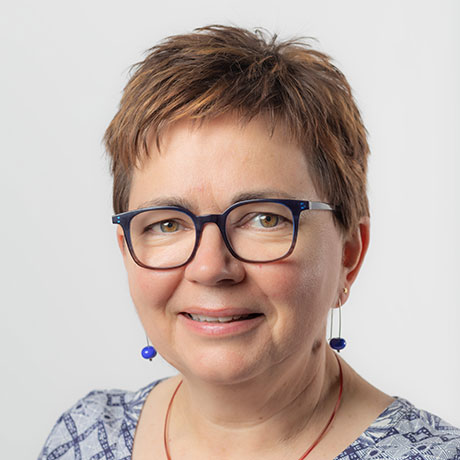
Stephanie Dowden
Stephanie Dowden
 Stephanie Dowden has over 30 years of experience in children’s health care across New Zealand, Australia, the UK, and Uzbekistan (with Médecins Sans Frontières). Her paediatric expertise spans from generalist to specialist roles, encompassing primary health care, community development, paediatric ICU and emergency, pain management, palliative care, and Aboriginal health. Stephanie has held positions at the Royal Children’s Hospital in Melbourne, Great Ormond Street Children’s Hospital in London and Princess Margaret Hospital in Perth.
Stephanie Dowden has over 30 years of experience in children’s health care across New Zealand, Australia, the UK, and Uzbekistan (with Médecins Sans Frontières). Her paediatric expertise spans from generalist to specialist roles, encompassing primary health care, community development, paediatric ICU and emergency, pain management, palliative care, and Aboriginal health. Stephanie has held positions at the Royal Children’s Hospital in Melbourne, Great Ormond Street Children’s Hospital in London and Princess Margaret Hospital in Perth.
Since 2016, Stephanie has worked independently in Perth as a Paediatric Nurse Practitioner. Her social enterprise, NursePrac Australia, is dedicated to improving children’s outcomes and addressing social determinants of health in Western Australia. It provides health service consultancy, education, and operates a nurse practitioner-led clinic, Just Kids Health, which offers comprehensive health care and supports parents in managing their children’s health at home. A core mission of NursePrac Australia is advocating for parents who may feel marginalised, uncertain about their healthcare options, or in need of support in navigating healthcare services for their families. NursePrac Australia collaborates with healthcare providers, communities, schools, and non-government organisations to enhance health outcomes through innovative care models, facilitating access to health care in diverse settings and testing new approaches.
Stephanie is an experienced director, board member and clinical leader, currently serving on The Academy of Child and Adolescent Health’s board, and she is the inaugural Chair of Connecting Community for Kids. She is a Member of the World Health Organization’s Guideline Development Group: Management of Infants and Children with Obesity. She is one of only four Australians and the only clinically practising nurse in the Development Group.
Stephanie is a passionate advocate for nurse practitioners, committed to enhancing their visibility and community understanding of the role. As a disruptive innovator, Stephanie has refined her care model outside the public-hospital system, integrating values of social justice and health equity with provision of high-quality, evidence-based health care in non-traditional settings.
Media release statement
When I couldn’t find employment as a nurse practitioner, I had the somewhat crazy idea to start my own children’s clinic. I had no backers and no business experience. This led me to try various models and ideas in order to survive financially. Looking back, the main reason my business has survived, despite COVID and economic downturns, is that I’ve learned to be very adaptable and seize any opportunity. Starting a novel model in health care has been incredibly challenging but the partners I’ve found who shared my vision have made it successful. And best of all, I can see the positive impact this model of care has on children and families.
I love being a children’s nurse practitioner because I can use all my years of experience and work at a very advanced level to make a real difference to children’s lives. It’s the best job ever.
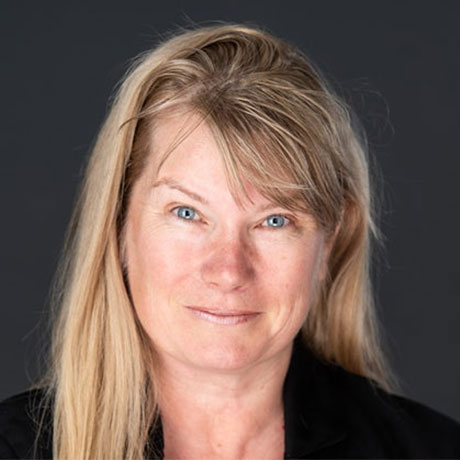
Professor Marion Eckert MACN
Professor Marion Eckert MACN
 Professor Eckert is Professor of Cancer, and Health Enterprise and Innovation, and founding Director of the Rosemary Bryant AO Research Centre (RBRC), University of South Australia. She is the inaugural Professor of Cancer Nursing in SA and Adjunct Professor Flinders University. Marion does not have a traditional academic background, but one that is grounded in direct health service delivery and an unwavering commitment to improving care locally and globally.
Professor Eckert is Professor of Cancer, and Health Enterprise and Innovation, and founding Director of the Rosemary Bryant AO Research Centre (RBRC), University of South Australia. She is the inaugural Professor of Cancer Nursing in SA and Adjunct Professor Flinders University. Marion does not have a traditional academic background, but one that is grounded in direct health service delivery and an unwavering commitment to improving care locally and globally.
Motivated by the questions, “How do we ensure that people receive the very best possible care?” and “How do we support the workforce to achieve this?” she has led the development of a strategic research agenda focused on high-impact nursing and midwifery research, applying evidence into practice across the healthcare system for the benefit of communities and society.
The RBRC was established through the pioneering efforts of the Australian Nursing and Midwifery Federation (SA Branch) and the University of South Australia to empower the nursing and midwifery workforce through evidence-informed care. With these partners, Marion established the Centre, now recognising over 70 research members and strong national and international interdisciplinary partnerships. With five research labs focused on Workforce, Clinical, Co-Design, Performance, and Digital Health, RBRC is recognised globally as the pivotal interface between research and clinical practice. Marion is the Co-Founder and Executive Chair of the Australasian Nursing and Midwifery Clinical Trials Network (ANMCTN), which brings together over 30 academic institutions, industry, and individuals to effectively facilitate and support nurse and midwife-led clinical research from Australia and New Zealand.
Awarded a Churchill Fellowship for supportive cancer care, a finalist in SA Telstra Business Woman of the Year (2020), a finalist in SA Health Research Innovation, and an International Nurse Researcher Hall of Fame inductee (2024), Marion believes that leadership and learning are indispensable. With this belief, she is currently completing a Bachelor of Law Degree (Honours).
Little can be done alone, success is never a solo journey. Having the opportunity to be innovative and create change has no limits when you have the right team.
Media release statement
I am honoured to be a finalist for the 2024 Health Minister’s Award for Nursing Trailblazers. As Professor of Cancer, and Health Enterprise and Innovation, and founding Director of the Rosemary Bryant AO Research Centre (RBRC) at the University of South Australia, this recognition highlights the trailblazing work of the Centre and our commitment to advancing evidence-informed care and empowering nurses and midwives.
Throughout my diverse and exciting career, I have dedicated myself to improving care and supporting nurses and midwives to be disrupters and informed advocates for their patients and communities. Our work at RBRC empowers the nursing and midwifery workforce through evidence-based care. With over 70 research members and five focused labs, we’ve made significant impacts, including nurse-led skin screening with the support of AI in regional Australia and now expanding across prison health services, developing predictive risk algorithms, revolutionising dementia care and developing global workforce wellbeing surveys and running the largest health workforce survey across Australia during COVID-19.
A notable achievement is co-founding the Australasian Nursing and Midwifery Clinical Trials Network (ANMCTN), uniting over 30 academic institutions to support nurse and midwife-led research in Australia and New Zealand.
“My dedication to improving care is fuelled by a profound belief that every patient deserves the best possible support, and every nurse and midwife should be equipped to provide it,” said Professor Marion Eckert.“ I am inspired by the collective efforts of my dedicated colleagues, collaborators, and supportive family. It motivates me to continue driving meaningful change in health care through collaboration and innovation.”
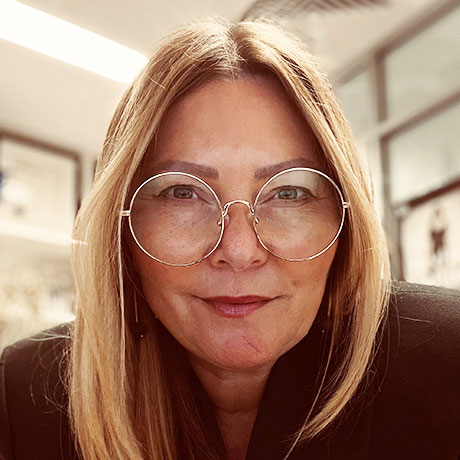
Dr Nina Sivertsen MACN
Dr Nina Sivertsen MACN
 Nina Sivertsen RN, BNg (Hons First Class), Grad Cert Ed (Higher Ed), PhD (Ng/Midwif), MACN
Nina Sivertsen RN, BNg (Hons First Class), Grad Cert Ed (Higher Ed), PhD (Ng/Midwif), MACN
Dr Nina Sivertsen is an Indigenous Sámi woman from the Arctic living and working on Kaurna Lands in Australia. She holds a position as Senior Lecturer (Nursing), Flinders University, and Associate Professor, Arctic University of Norway. Her academic work encompasses curriculum design and implementation, with cultural responsiveness in the centre to positively engage students in learning about First Nations health.
In her research, she focuses on community and health systems research in partnership with First Peoples and contributes to restorative policy and practice, especially around women’s health in a socio-political context of assimilation and colonisation. She works in inter-Indigenous settings together with First Nations health professionals from around the world to improve health care and health outcomes for all First Nations people.
Nina’s work in the nexus of Indigenous women’s identities, culture, health, and education has led to international recognition as evidenced by her partnerships in Norway, Canada and Australia. She is the recipient of numerous awards; amongst them 2022 Reconciliation Award, 2021 Women in Innovation Award, the 2020 Vice-Chancellor’s Award for Innovation in Teaching, as well as being a finalist of the 2021 AFR National Teaching Excellence Awards.
Dr Sivertsen works with research higher degree students to create new knowledge and build capacity enabling students to fulfil their potential as independent academics and researchers of the future.
Media release statement
As an Arctic First Nations nurse, clinician, and researcher, Dr Sivertsen collaborates with First Nations health professionals globally to improve healthcare outcomes. Working with Aboriginal and Torres Strait Islander colleagues, she focuses on Indigenous family health, clinical care, and integrating Indigenous perspectives in higher education. She developed the Kumangka Tirkanthi – Learning Together as One, a nurse-led co-teaching model for nursing students to better understand Aboriginal and Torres Strait Islander needs in mainstream health services. This ground-breaking Bachelor of Nursing (BN) subject, co-delivered by nursing academics and Aboriginal cultural navigators, enriches learning through lived experiences and critical analysis of colonisation, racism, and health policies. The model prepares nursing students, especially non-Indigenous, as burgeoning health professionals, to contribute competently to First Nations Peoples’ health needs and provide culturally safe care. Developed in partnership with the local Aboriginal and Torres Strait Islander community, the Kumangka Tirkanthi model enhances capacity building and cross-cultural collaboration with Indigenous knowledge holders. Since 2018, over 4,000 students have engaged in this program, contributing to improved cross-cultural understanding and clinical practice of graduate nurses. Dr Sivertsen is committed to innovate and elevate the standards of nursing practice for the benefit of our community.
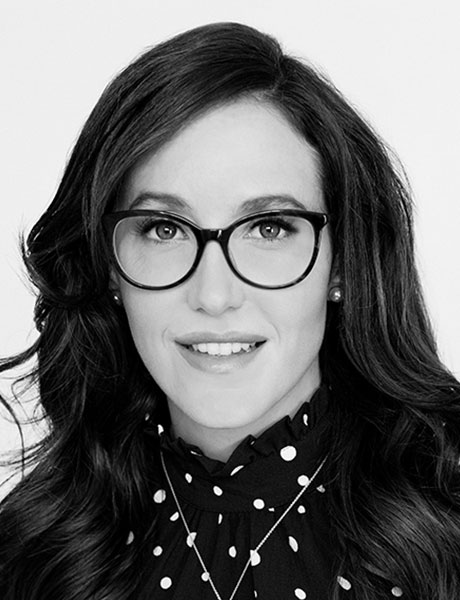
Lauren Barber MACN
Lauren Barber MACN
 Ms Barber drew inspiration from her personal experience to start NeedleCalm Pty Ltd, a company focused on changing the narrative around needle phobia and advocating for education in needle procedures.
Ms Barber drew inspiration from her personal experience to start NeedleCalm Pty Ltd, a company focused on changing the narrative around needle phobia and advocating for education in needle procedures.
As the founder and Managing Director of NeedleCalm, Ms Barber’s biggest challenge is creating awareness about the consequences of needle-phobia avoidance, a surprisingly under-researched area in health care.
NeedleCalm has launched a new, world-leading medical device in Australia to improve vaccination rates and calm the nerves of the approximately six million Australians who fear injections.
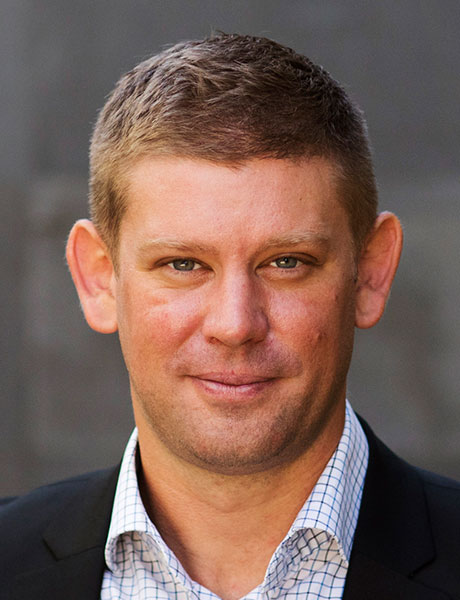
Professor Caleb Ferguson FACN
Professor Caleb Ferguson FACN
 Professor Ferguson’s mission is to revolutionise stroke prevention through scalable technology to enable the widespread provision of theory-driven education to support behaviour change and help fight stroke.
Professor Ferguson’s mission is to revolutionise stroke prevention through scalable technology to enable the widespread provision of theory-driven education to support behaviour change and help fight stroke.
Currently, life-saving treatment includes stroke prevention medications that thin the blood, and anticoagulants to reduce the risk of stroke in patients with Atrial Fibrillation. But Dr Ferguson says people do not always take medicines as directed or sometimes stop taking them.
He used a new learning delivery platform called Qstream to improve cardiovascular nurses’ and patients’ knowledge and practices related to stroke prevention, atrial fibrillation, and anticoagulation therapy.
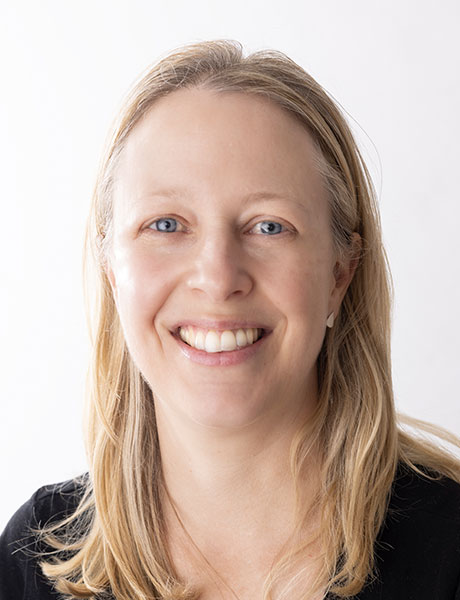
Tammy Harvey
Tammy Harvey
 Tammy is an endorsed nurse practitioner (NP) who helped to establish a NP led model of care in a rural hospital in Tasmania.
Tammy is an endorsed nurse practitioner (NP) who helped to establish a NP led model of care in a rural hospital in Tasmania.
The model of care established in 2018 aims to increase bed occupancy and underutilised rural hospital resources and enable a restoration/rehabilitation focus for acute and subacute patients. It was initially set up with a geriatrician and NP and is now a GP/NP shared care model with a team of experienced nurses and allied health specialists.
Achievements include increased bed occupancy, reduced iatrogenic complications such as falls, delirium and pressure injuries and consistently positive patient feedback.
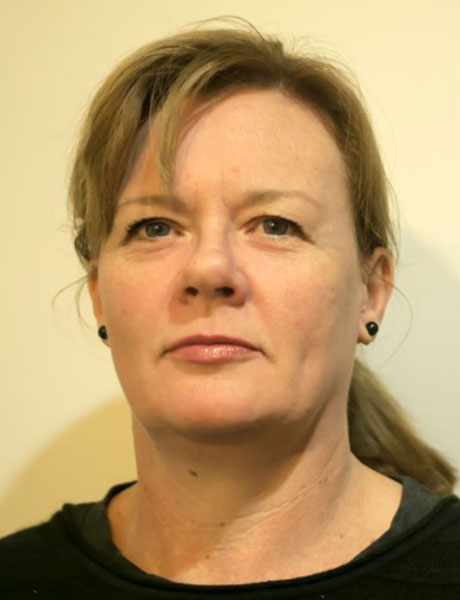
Toni Slotnes-O’Brien MACN
Toni Slotnes-O’Brien MACN
 Transgender Australians are arguably among our community’s most marginalised and socioeconomically disadvantaged groups. Ms Slotnes-O’Brien opened a Nurse Practitioner-led clinic to address patients’ physical, mental, and social needs in line with the World Professional Association for Transgender Health Standards of Care.
Transgender Australians are arguably among our community’s most marginalised and socioeconomically disadvantaged groups. Ms Slotnes-O’Brien opened a Nurse Practitioner-led clinic to address patients’ physical, mental, and social needs in line with the World Professional Association for Transgender Health Standards of Care.
The clinic is an inclusive and interprofessional model of care for transgender individuals and is a necessary step towards providing a very needed service for transgender individuals. Nurse Practitioners prescribe gender-affirming medical care and coordinate a multidisciplinary approach to providing low-cost health care.
The clinic aims to lower suicide rates, improve mental health, and provide the best gender-affirming care and coordination of care to enable trans and gender-diverse people to live a life without barriers.

Claire Lane MACN
Claire Lane MACN
 Founded the not-for-profit Save Our Supplies (SOS) in 2012 in Brisbane, Claire Lane takes on the challenge of addressing the enormous waste in the hospital system. SOS supplies collection bins in the hospital’s operating theatres where the staff deposit clean, usable supplies. SOS collects, repackages and collaborates with partners like Rotary to send the supplies to countries that need them. SOS eliminates waste, reduces landfill and greenhouse gas emissions, reduces hospital waste removal fees and provides much-needed medical help to those who need it. Being a Founder and CEO of a small business, Claire leads a team of two volunteer staff and is responsible for all operational duties on top of her clinical role at Saint Vincent’s Northside Hospital.
Founded the not-for-profit Save Our Supplies (SOS) in 2012 in Brisbane, Claire Lane takes on the challenge of addressing the enormous waste in the hospital system. SOS supplies collection bins in the hospital’s operating theatres where the staff deposit clean, usable supplies. SOS collects, repackages and collaborates with partners like Rotary to send the supplies to countries that need them. SOS eliminates waste, reduces landfill and greenhouse gas emissions, reduces hospital waste removal fees and provides much-needed medical help to those who need it. Being a Founder and CEO of a small business, Claire leads a team of two volunteer staff and is responsible for all operational duties on top of her clinical role at Saint Vincent’s Northside Hospital.
Claire became a single supporting mum with two dependent children about the same time she founded Save Our Supplies. Now that the children are older, they have proved great “little helpers” for the charity. This helps the younger generation understand that looking after the planet is everyone’s responsibility and make it a better place to live, as well as appreciate the living conditions across the globe.
Claire graduated Bachelor of Nursing from the University of South Australia in 2015.
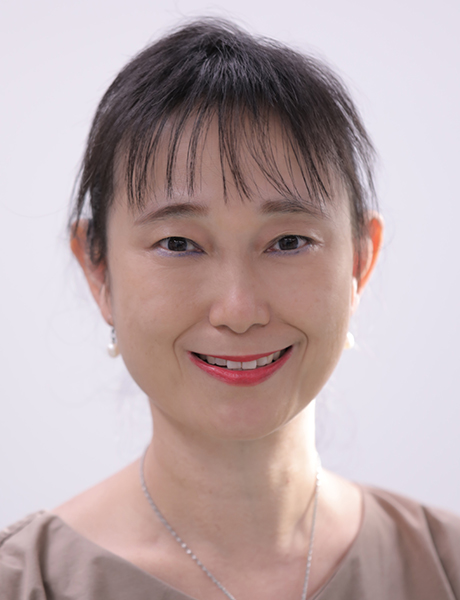
Professor Josephine Chow MACN
Professor Josephine Chow MACN
 Professor Josephine Chow is the Foundation Professor of the South Western Sydney (SWS) Nursing and Midwifery Research Alliance and the Ingham Institute for Applied Medical Research. She is the Deputy Director of Research, SWS Local Health District (SWSLHD) and Honorary Professor at the University of New South Wales, Western Sydney University and the University of Sydney. She holds senior executive positions and a portfolio in NSW Health which has influenced government policy and clinical practice through roles on State Clinical Networks and international peak bodies.
Professor Josephine Chow is the Foundation Professor of the South Western Sydney (SWS) Nursing and Midwifery Research Alliance and the Ingham Institute for Applied Medical Research. She is the Deputy Director of Research, SWS Local Health District (SWSLHD) and Honorary Professor at the University of New South Wales, Western Sydney University and the University of Sydney. She holds senior executive positions and a portfolio in NSW Health which has influenced government policy and clinical practice through roles on State Clinical Networks and international peak bodies.
Professor Chow has developed and successfully implemented the SWSLHD Clinical Nurse Consultant Research Quarantine Time Program and fosters the capacity and capability development of nurses and midwives. Furthermore, her translational research and implementation work have had major impacts on policy and clinical practice in many areas, from palliative care to COVID-19. She is currently on the editorial boards of several peer-reviewed journals and is a reviewer for ten other journals, authored over 187 peer-reviewed publications, 98 as the first author. She has presented over 80 abstracts in scientific forums and delivered 45 papers as an invited international speaker in the past five years. She has supervised over 20 higher degree students in nursing, psychology and management.
Professor Chow was nominated for her leadership in developing an innovative model of digital healthcare using artificial intelligence for vulnerable populations at SWSLHD.
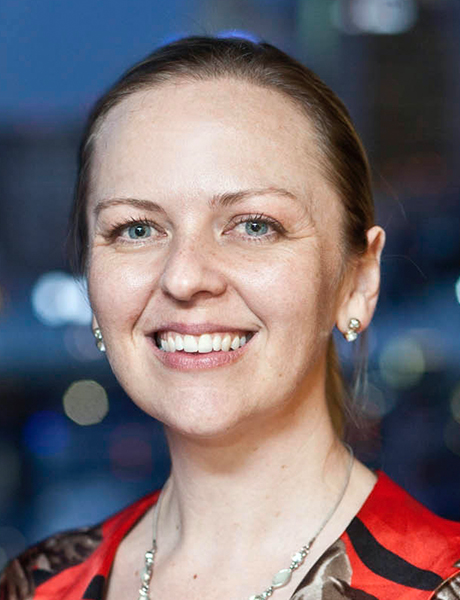
Dr Kate Holliday MACN
Dr Kate Holliday MACN

Dr Kate Holliday is a nurse, researcher, Chief Executive and Founder of the Centre for Community-Driven Research. Dr Holliday developed the Pathways Telehealth Nurse Specialists program, a model of care which has now been taken up across 18 disease areas that provides patients with a holistic care plan and makes the best use of all that is available to them in the Australian health system.
With 20 years of experience in the health sector, Dr Holliday was listed on the 100+ Outstanding Women Nurse and Midwife Leaders by the International Council of Nurses, Women in Global Health, World Health Organisation and United Nations Development Programme.
Dr Holliday holds a Bachelor of Nursing degree, a graduate diploma in nutrition, a Master in Health Promotion, and a Master in Health Science. Her doctoral thesis investigates the relationship between research and translating results into policy, clinical practice and population health.
She has held a mix of clinical work alongside policy, research and advocacy and has experience working with government, industry, not-for-profit organisations as well as research and international organisations, including working in Geneva, Switzerland, with the Global Alliance for Vaccines and Immunisations. She has also worked in leadership roles, including Head of Research at Cancer Council NSW Australia and as a Board Director at Health Technology Assessment International.
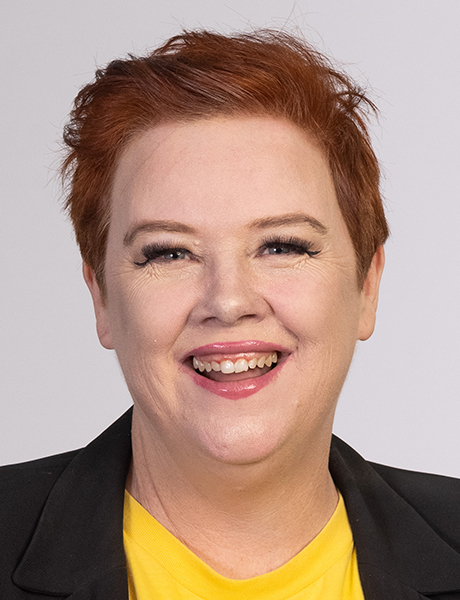
Sonia Martin MACN
Sonia Martin MACN
 Powered by a passion to decrease stigma around homelessness, Sonia Martin had a vision to step up and tackle the issues head-on and provide access to quality health care for thousands of vulnerable Australians.
Powered by a passion to decrease stigma around homelessness, Sonia Martin had a vision to step up and tackle the issues head-on and provide access to quality health care for thousands of vulnerable Australians.
A nurse through and through, Sonia has spent a lot of time with people on the streets who have been disengaged from health care for years, listening to their stories and their worries. She was struck by the loneliness of people sleeping rough and doing it tough and combined with witnessing hundreds of representations to the Emergency Department in the role of Nurse Unit Manager, she decided she had to do something different for vulnerable Australians. So, she made the courageous decision to resign from her permanent public health sector managerial role together with Dr Nova Evans, to address the gap in provision of care to people experiencing poverty and homelessness in Australia.
In 2018, Sonia and Nova, who passionately believe there had to be a better way to provide equitable, quality health care for vulnerable Australians, decided to put their vision into action and literally take health care to the streets.
Sonia began to change the lives of thousands of Australians by setting up a simple nursing kit and started providing health care from the back of a car boot. This led to the development of the innovative service we know today as Sunny Street.
Whilst many of Sonia’s friends and family told her it wasn’t possible to step out and truly make a difference, Sonia backed herself and found the way forward. Today, Sunny Street is an award-winning health care service and since 2018, has provided over 30,000 consultations.
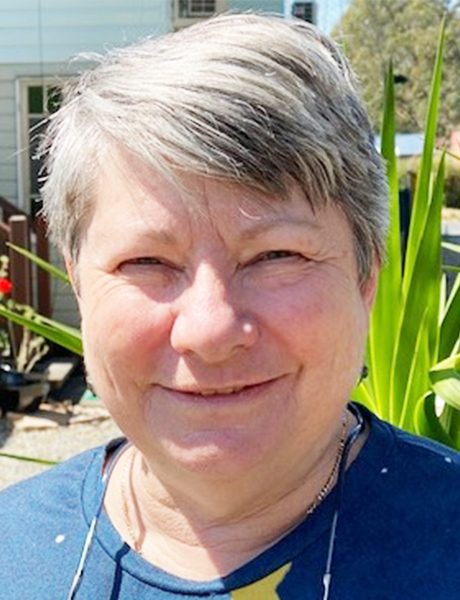
Carey Blaik MACN
Carey Blaik MACN
 Carey originally trained as a nurse and has over 30 years’ experience in both hospital and outpatient settings. She has undertaken additional study in mental health management and trauma awareness.
Carey originally trained as a nurse and has over 30 years’ experience in both hospital and outpatient settings. She has undertaken additional study in mental health management and trauma awareness.
Carey is the Founder and Director of Our House Our Haven, which was established in 2016 after she recognised a distinct lack of services targeted at mental illness sufferers who had been either discharged or felt unsupported by the current hospital-based models of care.
Carey’s vision was to provide a safe, non-clinical feeling space for her patients to feel comfortable to develop a sense of purpose and receive therapy through holistic experiences and social immersion in addition to the existing medical support.
Our House Our Haven is set on 2 acres and is a unique facility run largely by volunteers and has been successfully rehabilitating those most consumed by mental illness and helping them redevelop their sense of place within the community. Starting from very small beginnings, Carey continues to work pro bono with fierce dedication.
Carey is incredibly passionate about providing care to those who most need it, by breaking down the barriers that typically prevent them from seeking professional help. Carey hopes the service will reduce the stigma around mental health and normalise seeking help in an unconventional environment.
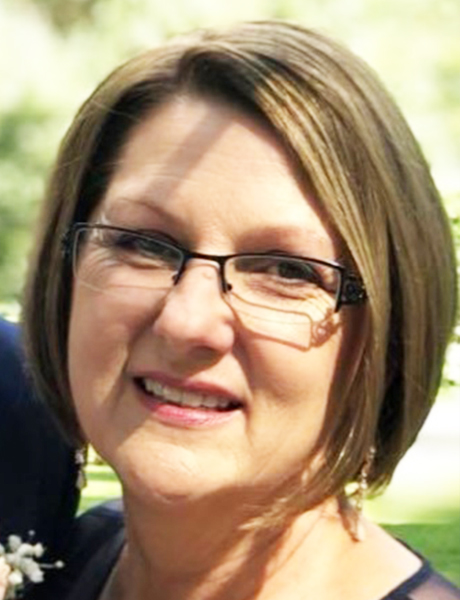
Julie Westaway MACN
Julie Westaway MACN
 Over the last 40 years, Julie Westaway has had extensive nursing experience as a Registered Nurse, midwife, lactation consultant, child and adolescent health nurse, and community continence clinical nurse consultant.
Over the last 40 years, Julie Westaway has had extensive nursing experience as a Registered Nurse, midwife, lactation consultant, child and adolescent health nurse, and community continence clinical nurse consultant.
Julie initially developed the Continence Specialist Nurse position within the Darling Downs Hospital and Health Service in which she worked tirelessly providing specialist continence care for children and adolescents with chronic health conditions in acute and community sectors.
Ten years ago, Julie collaborated with a consultant with a special interest in urogynaecology to undertake a review of international and national recommendations and guidelines after significant gaps in service provision were identified from clinical audits, wait lists and risk analysis.
As a strong advocate and pioneer for women’s health, Julie embraced her passion and experience to transform Women’s Health Services for Darling Downs Health. This has provided a platform to develop a unique specialist nursing model of care, and establishment of the Nurse Practitioner Urogynaecology and Continence role.
Julie has strong mentoring and leadership attributes, contributing to National webinars, forums, conferences and credentialling. She has been a content writer and reviewer for the Australian College of Nursing, Continence Foundation of Australia and Benchmarque, developing Certificate 2 and post graduate training programs.
Julie is also a recipient of the 2017 award for Patient Dignity and is a recipient of the 2019 Grateful Patient Program. In 2015, she was awarded Queensland Urological Nurses Conference Best Abstract and in 2009, the Excellence in Education & Research Award by the Toowoomba Hospital Foundation.
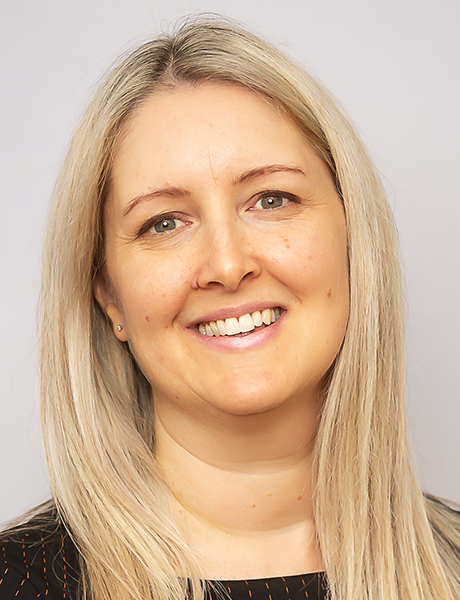
Lisa Hellwege MACN
Lisa Hellwege MACN
 Lisa identified a gap in the market for providing safe and gentle micro-suction procedures for earwax removal after working for many years in the ENT field. She believed there had to be a better way to access this procedure without extensive waiting times. This led to a process of discovery and entrepreneurship that resulted in the founding of Earworx in 2016; a nurse-led dedicated professional earwax removal service.
Lisa identified a gap in the market for providing safe and gentle micro-suction procedures for earwax removal after working for many years in the ENT field. She believed there had to be a better way to access this procedure without extensive waiting times. This led to a process of discovery and entrepreneurship that resulted in the founding of Earworx in 2016; a nurse-led dedicated professional earwax removal service.
Lisa’s idea to take a procedure previously only available via an ENT specialist to the Tasmanian community was embraced by both the medical and audiology professions, and by the public. Earworx has now expanded nationally with 26 (and growing) clinics across five states.
Lisa leads a vast national clinical team and has designed and now delivers extensive online education, practical-based training and ongoing support to 26 Registered Nurses working with Earworx.
Motivated and inspired by a desire to maintain excellence in standards of care, Lisa works each day to ensure Earworx Registered Nurses work to the highest-clinical levels and are professionally supported within their scope of practice. Lisa is passionate about Earworx clients receiving the same high-quality care, no matter where they live.
An advocate for the advancement of nursing, Lisa is inspired to empower nurses through their professional development as she believes their education, skills and expertise directly impacts on the efficiency of Australia’s health care system.
Lisa has over 27 years’ experience in nursing, holds a Bachelor of Nursing, qualifications in Micro-suction, Aural Hygiene and Aural Care. Lisa has now also cleaned 40,000 ears!
Lisa was State Coordinator of the Otorhinolaryngology Head and Neck Nurses Group Tasmania for six years, coordinating nurse and audiology education alongside ENT specialists to bring education experiences to Registered Nurses and allied health professionals in her field.
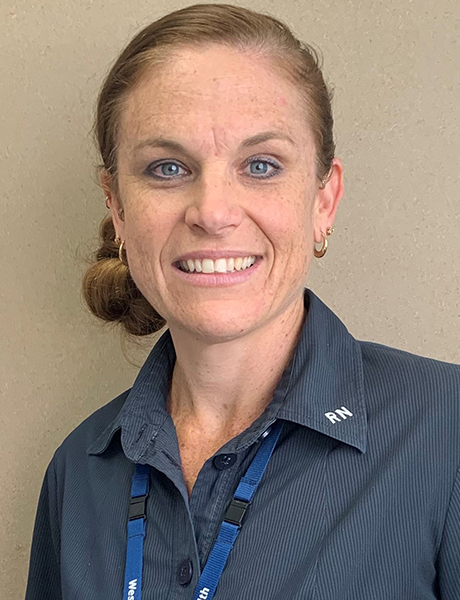
Shannon Wallis MACN
Shannon Wallis MACN
 Shannon Wallis MACN is the Virtual Care Nurse Unit Manager at West Moreton Health Service (WMHS) and is leading clinical teams to oversee the establishment of a virtual hospital, the MeCare program, the Heart Health Hub and a range of ‘light touch’ programs including COVID virtual beds and gestational diabetes program. Shannon strives to support, encourage and develop all staff who work within WMHS to deliver virtual care to ensure patients are provided with a suite of virtual care models that facilitate a smooth transition through different stages in their health care journey. These innovative programs use remote patient monitoring, telehealth, clinical software and reporting to focus on delivering personalised care to patients in their own home and reduce the burden on hospital resources.
Shannon Wallis MACN is the Virtual Care Nurse Unit Manager at West Moreton Health Service (WMHS) and is leading clinical teams to oversee the establishment of a virtual hospital, the MeCare program, the Heart Health Hub and a range of ‘light touch’ programs including COVID virtual beds and gestational diabetes program. Shannon strives to support, encourage and develop all staff who work within WMHS to deliver virtual care to ensure patients are provided with a suite of virtual care models that facilitate a smooth transition through different stages in their health care journey. These innovative programs use remote patient monitoring, telehealth, clinical software and reporting to focus on delivering personalised care to patients in their own home and reduce the burden on hospital resources.
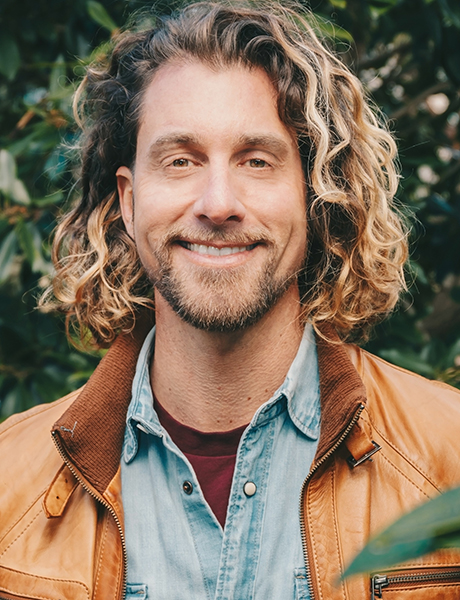
Matiu Bush
Matiu Bush
 Matiu Bush is a hybrid nurse practitioner and designer who founded One Good Street, a social impact platform to encourage neighbour-initiated care for older residents at risk of social isolation and loneliness. Matiu is currently the General Manger for Infection Prevention Operation COVID-19 accommodation in Victoria, has a Master’s degree in Public Health and has broad clinical and managerial nursing experience, including working in Tijuana, Mexico with Nobel Prize Laureate Mother Teresa. Matiu was named one of the top 25 most influential people in the Australian Social Sector by Probono in 2020 and developed the concept for the world’s first wearable to detect loneliness.
Matiu Bush is a hybrid nurse practitioner and designer who founded One Good Street, a social impact platform to encourage neighbour-initiated care for older residents at risk of social isolation and loneliness. Matiu is currently the General Manger for Infection Prevention Operation COVID-19 accommodation in Victoria, has a Master’s degree in Public Health and has broad clinical and managerial nursing experience, including working in Tijuana, Mexico with Nobel Prize Laureate Mother Teresa. Matiu was named one of the top 25 most influential people in the Australian Social Sector by Probono in 2020 and developed the concept for the world’s first wearable to detect loneliness.
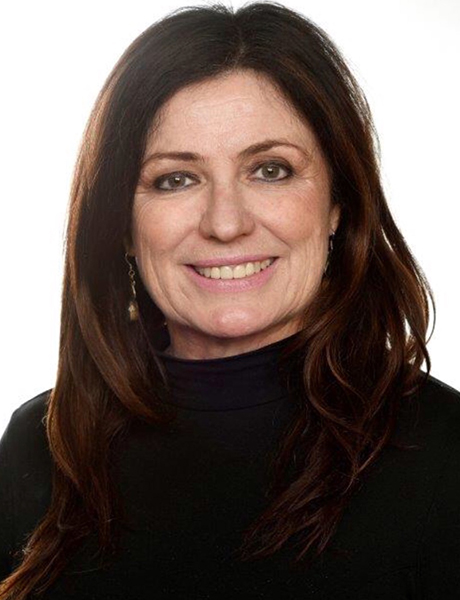
Lorna Cook MACN
Lorna Cook MACN
 Lorna Cook MACN has had a long and rewarding career in nursing. As a young, single mother of three, she recognised the need to embrace continuous education and subsequently completed her Bachelor of Health Science, a Master’s Degree in Nursing and, as her career pivoted, an MBA.
Lorna Cook MACN has had a long and rewarding career in nursing. As a young, single mother of three, she recognised the need to embrace continuous education and subsequently completed her Bachelor of Health Science, a Master’s Degree in Nursing and, as her career pivoted, an MBA.
This background gave her the insight to recognise opportunities available to nurses in a business setting. In 2012, Lorna co-founded a ground-breaking company called chemo@home which, as the name implies, provides chemotherapy to cancer patients in the patient’s home. Chemo@home has achieved significant success and is now a multi-award-winning national company, employing 80 staff and transforming cancer care.
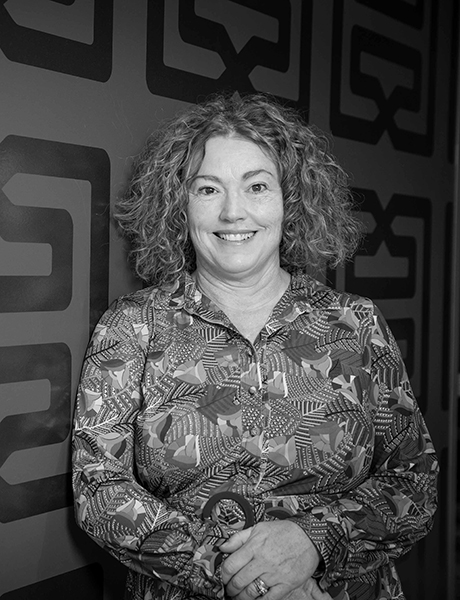
Nikki Johnston OAM MACN
Nikki Johnston OAM MACN
 Nikki became a registered nurse in 1989 and a Nurse Practitioner in 2008. She was recognised in the 2019 Australia Day Honors as a recipient of a Medal of the Order of Australia for her contribution to nursing.
Nikki became a registered nurse in 1989 and a Nurse Practitioner in 2008. She was recognised in the 2019 Australia Day Honors as a recipient of a Medal of the Order of Australia for her contribution to nursing.
Currently working for Calvary Health Care, Canberra Nikki believes all Australians deserve access to quality care in their last months of life regardless of their age, diagnosis or where they live. Currently end of life care experiences differ broadly for those living in residential aged care and access to specialist palliative care isn’t usual practice.
Nikki has initiated research through the INSPIRED trial which integrates specialist palliative care into residential aged care through the use of Palliative Care Needs Rounds. The trial found that regular rounds identified residents most at risk of dying without an adequate plan in place.
The INSPIRED trial has significantly reduced length of hospital stay and in-hospital deaths with significant costs savings to the community. Importantly, participants were more likely to experience a better-quality death (including better symptom control, advance planning, closeness with relatives and spiritual care).
Nikki’s approach improves Residential Aged Care Facility (RACF) staff confidence in discussing death and dying with families and planning for symptoms and goals of care at end of life. It supports palliative care in RACF and normalises death and dying, while providing essential anticipatory prescribing and better decision-making leading to planned care for residents.
Nikki’s work was influential in the Commonwealth’s decision to provide $32.8 of funding in the 2018-2019 Budget to support older Australian living in RACFs. The INSPIRED model of care is being rolled out in three States/Territories in Australia and being tested in rural and remote areas. Nikki has been recognised for her work nationally and internationally for integrating specialist palliative care into RACFs.
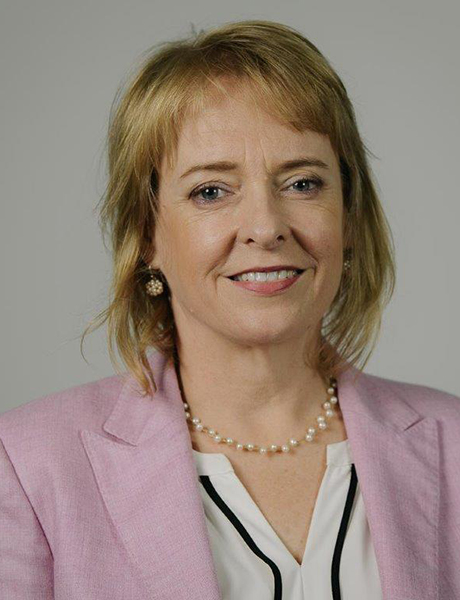
Professor Sandy Middleton FACN
Professor Sandy Middleton FACN
 Sandy Middleton is Professor of Nursing and Director of the Nursing Research Institute, a collaboration between St Vincent’s Health Australia Sydney and Australian Catholic University. Professor Middleton was the lead investigator on the landmark NHMRC-funded QASC cluster trial demonstrating decreased death and dependency following implementation of nurse-initiated, multidisciplinary protocols to manage fever, hyperglycaemia and swallowing post-stroke. Working with the NSW Agency for Clinical Innovation, Professor Middleton led the successful translation of these protocols into all 36 NSW stroke services. An independent economic evaluation demonstrated that over a 12-month period, if only 65% of eligible Australians received care in line with these protocols there would be a saving of $281M. This work now informs care recommendations in the Australian Clinical Guidelines for Stroke Management and internationally. These protocols now have been translated into 12 languages and are being implemented into 300 hospitals in 14 European countries. This program of work won the 2014 NSW Premier’s Public Sector Award for Improving Performance and Accountability, and multiple international awards. Professor Middleton also won the prestigious 2014 NSW Health Nursing and Midwifery Award for Excellence in Innovation Research. Professor Middleton has obtained extensive competitive funding and published in high impact journals including Lancet and New England Journal of Medicine. Professor Middleton is a member of the Board of Directors for the NSW Agency for Clinical Innovation and the Clinical Excellence Commission. She is leading the implementation science component of the Sydney Partnership for Health, Education, Research and Enterprise (SPHERE) one of Australia’s nine NHMRC-accredited Advanced Health Research and Translation Centres. She is also a Ministerial appointment to the NHMRC Health Translation Advisory Committee.
Sandy Middleton is Professor of Nursing and Director of the Nursing Research Institute, a collaboration between St Vincent’s Health Australia Sydney and Australian Catholic University. Professor Middleton was the lead investigator on the landmark NHMRC-funded QASC cluster trial demonstrating decreased death and dependency following implementation of nurse-initiated, multidisciplinary protocols to manage fever, hyperglycaemia and swallowing post-stroke. Working with the NSW Agency for Clinical Innovation, Professor Middleton led the successful translation of these protocols into all 36 NSW stroke services. An independent economic evaluation demonstrated that over a 12-month period, if only 65% of eligible Australians received care in line with these protocols there would be a saving of $281M. This work now informs care recommendations in the Australian Clinical Guidelines for Stroke Management and internationally. These protocols now have been translated into 12 languages and are being implemented into 300 hospitals in 14 European countries. This program of work won the 2014 NSW Premier’s Public Sector Award for Improving Performance and Accountability, and multiple international awards. Professor Middleton also won the prestigious 2014 NSW Health Nursing and Midwifery Award for Excellence in Innovation Research. Professor Middleton has obtained extensive competitive funding and published in high impact journals including Lancet and New England Journal of Medicine. Professor Middleton is a member of the Board of Directors for the NSW Agency for Clinical Innovation and the Clinical Excellence Commission. She is leading the implementation science component of the Sydney Partnership for Health, Education, Research and Enterprise (SPHERE) one of Australia’s nine NHMRC-accredited Advanced Health Research and Translation Centres. She is also a Ministerial appointment to the NHMRC Health Translation Advisory Committee.
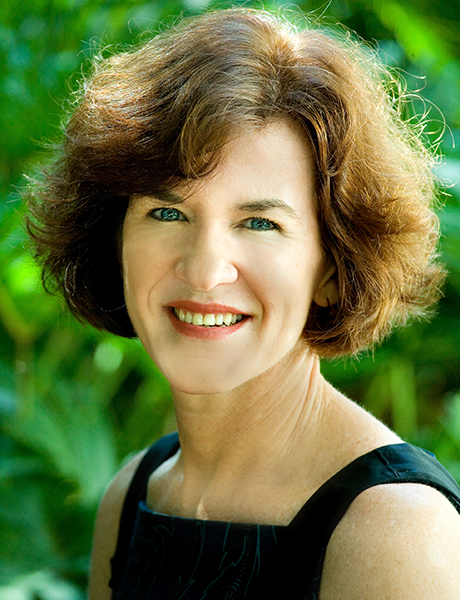
Professor Jeanine Young FACN
Professor Jeanine Young FACN
 Professor Jeanine Young, University of the Sunshine Coast, has worked in Australia and the United Kingdom in neonatal intensive care, paediatrics and community child health. Jeanine has a special interest in infant care practices; in particular breastfeeding and parent-infant bed-sharing. She works closely with Red Nose to ensure national infant sleep recommendations are evidence-based, and is passionate about growing community capacity through partnership models to address health inequalities associated with infant mortality. Jeanine has established a research program to investigate Queensland’s high infant mortality rate, with a focus on evidence-based strategies to assist health professionals in delivering Safe Sleeping messages to families with young infants. Through international collaborations and local community partnerships, Jeanine first introduced the Pēpi-Pod Program, a portable sleep space combined with safe sleep education as a strategy to promote safe infant sleeping and breastfeeding in the context of shared sleeping. This culturally appropriate and feasible strategy to reduce infant mortality has been integrated into service delivery rural, remote and metropolitan Aboriginal and Torres Strait Islander communities, Queensland, and more recently in other Australian states and territories. Jeanine has also initiated the first Australian trial of a sleep enabler suitable for postnatal units to support breastfeeding and promote safer infant sleep environments in hospital. Jeanine works in partnership with government, industry, safety and regulatory bodies, and communities in translating evidence into practical advice for parents. Her efforts in reducing infant mortality through supporting the role of health professionals and health promotion within communities have received state, national and international recognition. In collaboration with Change for our Children New Zealand, Jeanine is the Australian lead for the Pēpi-Pod Program, which comprises a practical infant sleep space suitable for shared sleeping embedded in safe sleep education, now available in metropolitan, rural and remote Aboriginal and Torres Strait Islander communities. Jeanine has also initiated the first Australian trial of a portable sleep space suitable for postnatal units to support breastfeeding and promote safer infant sleep environments in hospital.
Professor Jeanine Young, University of the Sunshine Coast, has worked in Australia and the United Kingdom in neonatal intensive care, paediatrics and community child health. Jeanine has a special interest in infant care practices; in particular breastfeeding and parent-infant bed-sharing. She works closely with Red Nose to ensure national infant sleep recommendations are evidence-based, and is passionate about growing community capacity through partnership models to address health inequalities associated with infant mortality. Jeanine has established a research program to investigate Queensland’s high infant mortality rate, with a focus on evidence-based strategies to assist health professionals in delivering Safe Sleeping messages to families with young infants. Through international collaborations and local community partnerships, Jeanine first introduced the Pēpi-Pod Program, a portable sleep space combined with safe sleep education as a strategy to promote safe infant sleeping and breastfeeding in the context of shared sleeping. This culturally appropriate and feasible strategy to reduce infant mortality has been integrated into service delivery rural, remote and metropolitan Aboriginal and Torres Strait Islander communities, Queensland, and more recently in other Australian states and territories. Jeanine has also initiated the first Australian trial of a sleep enabler suitable for postnatal units to support breastfeeding and promote safer infant sleep environments in hospital. Jeanine works in partnership with government, industry, safety and regulatory bodies, and communities in translating evidence into practical advice for parents. Her efforts in reducing infant mortality through supporting the role of health professionals and health promotion within communities have received state, national and international recognition. In collaboration with Change for our Children New Zealand, Jeanine is the Australian lead for the Pēpi-Pod Program, which comprises a practical infant sleep space suitable for shared sleeping embedded in safe sleep education, now available in metropolitan, rural and remote Aboriginal and Torres Strait Islander communities. Jeanine has also initiated the first Australian trial of a portable sleep space suitable for postnatal units to support breastfeeding and promote safer infant sleep environments in hospital.
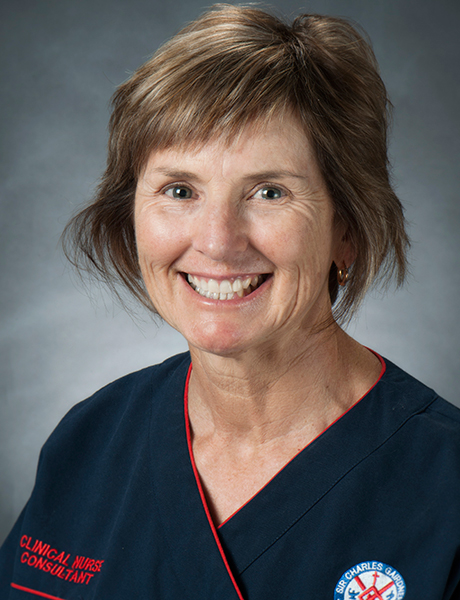
Linda Campbell
Linda Campbell
 Linda Campbell has over 30 years of experience in nursing including working in rural and remote areas of Australia and New Zealand, as well as the USA. She has an interest in blood transfusion and its alternatives, and was appointed as the Clinical Nurse Consultant for Patient Blood Management (PBM) at Sir Charles Gairdner Hospital (WA) in 2012. Linda has led the program since its inception.
Linda Campbell has over 30 years of experience in nursing including working in rural and remote areas of Australia and New Zealand, as well as the USA. She has an interest in blood transfusion and its alternatives, and was appointed as the Clinical Nurse Consultant for Patient Blood Management (PBM) at Sir Charles Gairdner Hospital (WA) in 2012. Linda has led the program since its inception.
PBM aims to decrease the risk of blood transfusion by optimising haemoglobin (Hb) and iron stores prior to elective surgery involving significant blood loss. Preoperative optimisation facilitates the post-op recovery of Hb and has the capacity to change transfusion practice. This intervention has significantly reduced transfusion rates in elective joint replacement patients and the model has been replicated at a secondary site and is now rolled out to other surgical specialties at SCGH.
It is important to Linda that patients receive equitable care despite the geographical challenges of living thousands of kilometers from Perth. Creating networks with GPs and regional healthcare providers has been instrumental in the success of PBM. Over 1000 patients across the State of Western Australia are referred to Linda annually and audit has shown that 99% of joint replacement patients receive PBM review and care. Educating clinical staff about the impact of blood transfusion and PBM has led Linda to contribute to GP clinical pathways, deliver presentations at State, National and International meetings and provide tutorials for WA undergraduate medical students.
The overall transfusion rate has fallen by 30% at SCGH since PBM was introduced. This not only has significant cost saving benefits (over $1.2 million annually) but has made a major contribution to patient safety and reduced the demand on the blood supply; ensuring that donor blood is available for trauma or transfusion dependent patients. Although PBM is relatively new evidence based discipline in medicine it is one of the few areas where improved outcomes, reduced risks and cost savings are all made at the same time. This legacy will continue to improve patient care for years to come.

